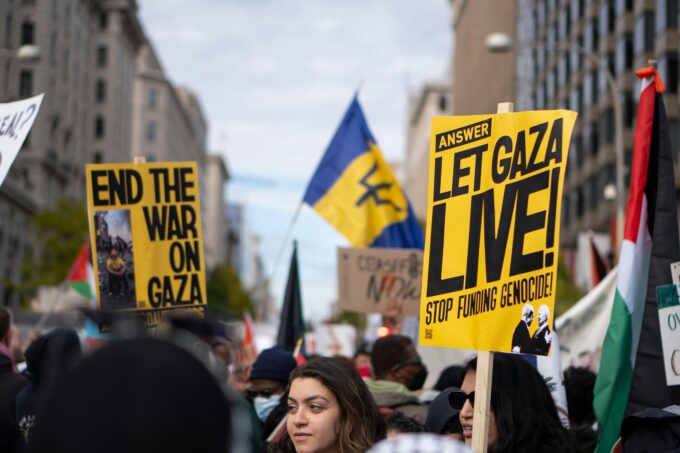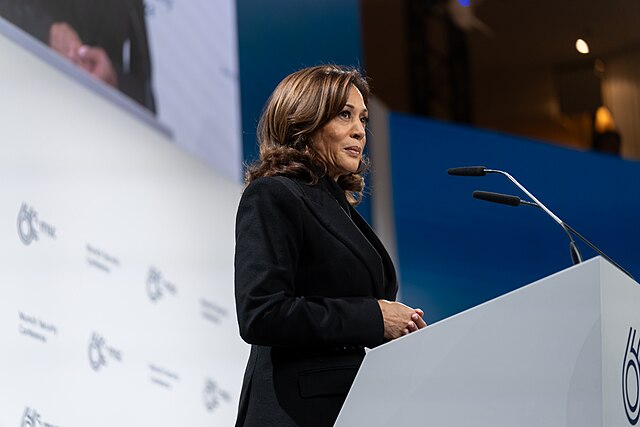
Image by Ian Hutchinson.
In Baghdad, the colonnaded streets and labyrinthine alleys of the old downtown are ghostlike by night. Here and there in the sprawling suburbs, hordes of depoliticized consumers swarm around neoliberal monuments of worship, parking their “cool” four-by-fours along Vegas-like avenues for an over-priced dinner of junk food from whatever spot social media influencers decide is in vogue.
At clogged crossroads, haggard children wipe windshields for a penny, unseen. Soldiers, concrete slabs, and images of dead militiamen are the paraphernalia of war and yesteryear’s security regimes, here for a latent state of emergency that lurks underneath a carefully manicured spectacle of a malformed, vulgar Iraqi renaissance.
Twenty-one years since the American-led invasion and occupation of Baghdad, this traumatizing mise-en-scène of a defeated city is a theatre where the obscenities of the corrupt and the nouveau riche play out, a soaring class wound incised deep in society after decades of patronage politics and theft articulating the unannounced.
The war raging far away in Palestine’s Ghezzeh seems like a distant, almost irrelevant phenomenon. A New York Times reporter with a questionable understanding of the region said that, although Iraqis are sympathetic with Palestinians, they “still feel overwhelmed by the aftermath of Iraq’s own conflicts.”
True, Iraqis may seem to be following the news of Palestine and their own country in silence, finding in sarcasm a momentary refuge from the countless indignities of everyday life, the slow death of their beloved cities, and the televised carnage Israel inflicts on the bodies, and abodes of the people of Ghezzeh.
The forced quietude of the Arab street has become a mirror for the Palestinian genocide. Yet in Iraq, this supposed resignation has less to do with an inward-looking, bruised nation than the appropriation and monopolization of every manifestation of solidarity by Shia armed and political factions.
The memories of sectarian violence and concomitant Palestinian cleansing, the state grab, and encroachment over the public sphere by these groupings have pushed Palestine solidarity to an ephemeral cyber sphere and bourgeois emporiums.
George Galloway and other supposed allies of the white Western “left” need to take heed.
In Baghdad, Cairo, Amman, and even Riyadh, years of warfare and decades-long political and security backing from the West have left organized opposition wounded, at loss. In both the urban and digital spheres they find a sleepless panopticon. Yet people have nevertheless spent years daring security apparatuses to find effective means of solidarity and peaceful expression.
“If the Muslim world was a real thing,” Galloway wrote on X, after the recent massacre of some 100 worshippers in Ghezzeh, “politically speaking, the massacre of over one hundred worshipers reading [sic] their Fajr prayer in Gaza this morning would be the last straw.”
“Where is the Ummah,” Myriam François, an outspoken journalist, wrote in another absurd X post in Arabic. Does the Palestinian cause concern Muslims alone?
Not only are the specificities of the Arab context made irrelevant, it seems that solidarity in an increasingly Right-leaning West has become an exercise in gaslighting.
Much ink was spilled on the “heroics” of American students and scholars in support of Palestine, less so on their Arab peers. Carrion-eaters in the western hemisphere have turned Ghezzeh, as the entire Arab world beforehand, into a career. Meanwhile, to the members of the tourist club of “Middle East correspondents,” it remains business as usual. There exists no urge to pen an op-ed against a biased, anti-Palestinian industry. Others pen bland columns, blabber on talk shows, and cash in by assuming the spokesman/woman-ship for the Palestinian wound abroad.
But what would it take to listen to, rather than speak over, Palestinians today?
Unrecognizable limbs, more limbs, a bag of charred human flesh and faces of shell-shocked children decorate the social media pages of famed influencers like a prized commodity hanged for legitimation. “How many more headless babies does it take!” goes the disingenuous cry. Aside from the harm inflicted by this guilt-driven urge to do something, white savorism, it seems, remains infectious.
Meanwhile, some diaspora artists and academics went as far as cheering on the “Iraqi Resistance” from the comfort of Berkley and London, leaving Iraqis wondering if these arm-chair revolutionaries would abandon their lives for tenure in Kufa, where they would surely join the downtrodden in future uprisings against the militias of this state-in-violation. Assuming their fluency in Arabic, perhaps they would file vicious tirades to the local press, too, brushing aside fears of a spectacular reprisal.
While Palestinians’ path of resistance is clear, the story is tad different in Iraq. For it is in the very nadir from which militia’s anti-imperialist rhetoric comes that the blood of their victims was spilled before and after the October Uprising of 2019, when thousands of Iraqis rose against two-decades of a lethally-failing US-installed, Iran-dominated political (dis)order.
Alas, it is the South West Asian and North African populations, those who are reduced to exotic objects of seasonal academic inquiry, and whose lands are haunted by the political decisions of diaspora communities, including Muslim voters and loyal state-department servants, who are to blame.
The Arab street has become a testing ground for the latest weaponry, a dream destination for the uninvited experts of America’s Middle East/Arab Operations (sorry, Studies) elite programs, and lastly, a site where a pampered “left” now projects its own impotence.
Leftists in Arab-authoritarianism have their own fights to undertake on their own terms, at the forefront of which is wrestling Palestine off the mediocre discourse of their rulers. They wait for no directives from an aloof “left”, let alone academics, in the West. Spare them your condescension.


